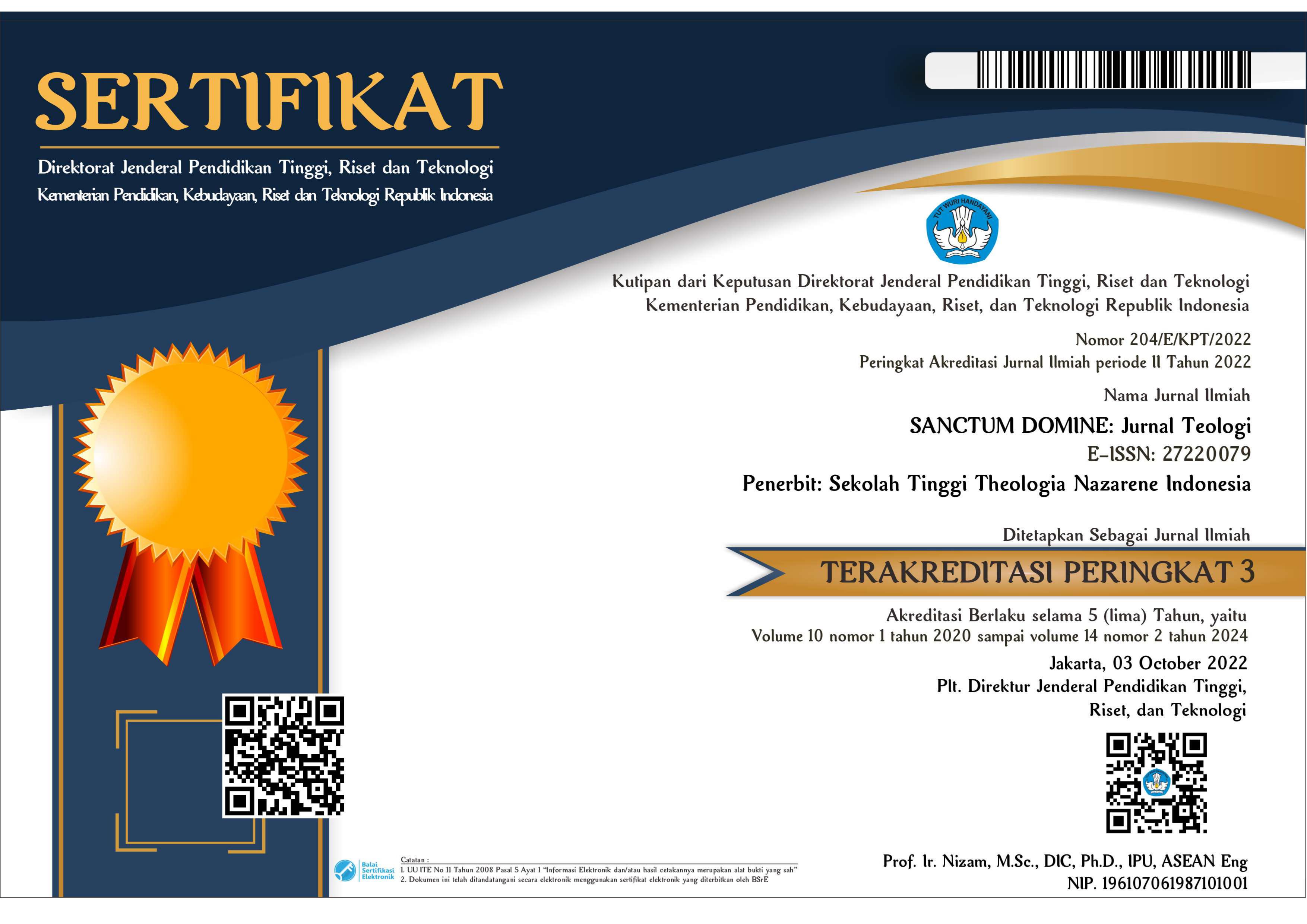Be Who You Are Meant To Be
Holiness in the Petrine Epistles
Abstract
The relationship between the Christian and culture is the overarching theme in the Petrine epistles, making them relevant now as they were first penned. Both 1 and 2 Peter can be considered as “epistles of hope” with “the best commentaries on Matthew 5:10, ‘blessed are the persecuted because of righteousness…” This paper’s primary question is: “In calling his readers to be holy in all their conduct, what does Peter identify as help and hindrances?” The answers are discussions of identity: the “identity” of the One who elects, the present identity of the elected people, and the life that identifies them as elect in contrast to the identity of the non-elect. By admonishing his audience to consider these, Peter hopes that they will remain committed to their faith in the midst of persecution and challenges. Instead of despair and apostasy, Christians ought to remember their identity and calling as the chosen people of God.
References
Achtimeier, Paul J. 1 Peter. Minneapolis: Fortress, 1996.
Asumang, Annang. “Resist Him’ (1 Peter 5:9): Holiness and Non-Retaliatory Responses to Unjust Suffering as ‘Holy War’ in 1 Peter.” Conspectus 11 (2011): 7–46.
Baker, Coleman A. “Peter and Paul in Acts and the Construction of Early Christian Identity.” Currents in Biblical Research 11, no. 3 (2013): 349–365.
Barbarick, Cliffod A. “You Shall Be Holy, For I Am Holy: Theosis in 1 Peter.” Journal of Theological Interpretation 9, no. 2 (2015): 292.
Bockmuehl, Markus. “The Transformation of Simon Peter.” Crux 48, no. 3 (n.d.): 13–22.
Bosman, Hendrik Ludolph. “Loving the Neighbor and the Resident Alien: Leviticus 19 as Ethical Redefinition of Holiness.” Pretoria 31 (2019): 71–90.
Byrley, Christopher. “The Southern Baptist Journal of Theology.” Persecution and the ‘Adversary’ of 1 Peter 5:8 21, no. 3 (2017): 77–98.
Clenendin, Daniel B. Eastern Orthodox Christianity: A Western Perspective. Grand Rapids: Baker Books, 1997.
David M. Robinson. “Partakers of the Divine Nature: Ripley’s Discourses and the Transcendental Annus Mirabilis.” Religions 9, no. 1 (2019): 1–12.
Decock, Paul B. “Toward Maturity in 1 Peter: Freedom, Holiness, Immortality.” In die Skriflig 50, no. 2 (2016): 1–8.
Dubis, Mark. 1 Peter: A Handbook in the Greek Text. Waco, TX: Baylor U. Press, 2010.
Duncan, John M. “Peter, Paul, and the Progymnasmata: Traces of the Preliminary Exercises in the Mission Speeches of Acts.” Perspectives in Religious Studies 41, no. 4 (2014): 349-365.
Eastvold, Kory. “The Image of God in Old Testament Theology,”.” Stone-Campbell Journal 21 (n.d.): 239-251.
Edwards, Dennis. 1 Peter. Grand Rapids, Michigan: Zondervan, 2017.
Eugenio, Dick O. “Humanization of Humanity: Christ–Likeness and the Renewal of the Imago Dei.” Mediator 9 (n.d.): 22–45.
Flemming, Dean. “Won Over Without a Word: Holiness and the Church’s Missional Identity in 1 Peter.” Wesleyan Theological Journal 49, no. 1 (n.d.): 50–66.
Gradikion, Klemes of. “The Holy Apostles Peter and Paul Vis-à-Vis Pagan Authorities.” Orthodox Tradition 32, no. 3 (2015): 10-18.
Green, Joel B. Living as Exiles: The Church in the Diaspora in 1 Peter. Edited by Kent Brower and Andy Johnson. Grand Rapids: Eerdmans, 2007.
Huizing, Brian Ruffner and Russell L. “A Trinitarian Leadership Model: Insights from the Apostle Peter.” Journal of Applied Christian Leadership 10, no. 2 (2016): 37–51.
Jo Bailey Wells. Belonging to God : 1 Peter and the New Testament Context. Sheffield, England: Sheffield Academic Press, 2000.
Jobes, Karen H. 1 Peter. Grand Rapids: Baker Academics, 2005.
Kraftchick, Steven J. Jude and 2 Peter. Nashville: Abingdon, 2002.
Lucas, Dick, and Christopher Green. The Message of 2 Peter and Jude. Leicester: InterVarsity, 1995.
Medved, Goran. “Theosis (Deification) as a Biblical and Historical Doctrine.” Kairos - Evangelical Journal of Theology 13, no. 1 (2019): 7–38.
Merwe, Dirk Van der. “Conceptualizing Holiness in the Gospel of John: The Mode and Objectives of Holiness.” Theological Studies 73 (2017): 1–9.
Meyendorff, Paul. “The Vocation and Mission of the People of God.” St. Vladimir’s Theological Quarterly 64 (2020): 209–227.
Oropeza, B. J. Churches Under Siege of Persecution and Assimilation: The General Epistles and Revelation. Eugene, Oregon: Cascade, 2012.
Plato. Phaedrus, in Five Works of Plato. Edited by A. D. Lindsay. London: J. M. Dent and Sons, 1927.
Powers, Daniel G. 1 & 2 Peter, Jude: A Commentary in the Wesleyan Tradition. Kansas City: Beacon Hill, 2010.
Reese, Ruth Anne. Holiness and Ecclesiology in Jude and 2 Peter. Edited by Kent Brower and Andy Johnson. Grand Rapids: Eerdmans, 2007.
Reuschling, Wyndy Corbin. “The Means and End in 2 Peter 1:3-11: The Theological and Moral Significance of Theosis.” Journal of Biblical Interpretation 8, no. 2 (2014): 275–286.
Rodgers, Peter R. 1 Peter: A Collaborative Commentary. Eugene, Oregon: Resource Publications, 2017.
Sibley, Jim R. “Israel and the Gospel of Peter, Paul, and Abraham.” Bibliotheca Sacra 173 (2016): 18–31.
Stavropoulos, Christoforos. Eastern Orthodox Theology: A Contemporary Reader. Edited by Daniel B. Clenendin. Grand Rapids: Baker Books, 1999.
Steuernagel, Valdir R. “An Exiled Community as a Missionary Community: A Study Based on 1 Peter 2:9, 10.” Evangelical Review of Theology 40, no. 3 (n.d.): 96–204.
Wheaton, Byron. “The Church as Heir of Israel’s Vocation as Royal Priesthood,.” The Southern Baptist Journal of Theology 22, no. 2 (n.d.): 61–79.
Williams, Travis B. Persecution in 1 Peter: Differentiating and Contextualising Early Christian Suffering. Leiden: Brill, 2012.
Wright, T. R. “D. H. Lawrence and the Bible.” Cambridge U. Press. Cambridge, 2000.
Copyright (c) 2021 SANCTUM DOMINE: JURNAL TEOLOGI

This work is licensed under a Creative Commons Attribution-NonCommercial-ShareAlike 4.0 International License.
This is an open-access article distributed under the terms of the Creative Commons Attribution-NonCommercial-ShareAlike 4.0 International License (http://creativecommons.org/licenses/by-nc-sa/4.0/) which permits unrestricted non-commercial used, distribution and reproduction in any medium

This work is licensed under a Creative Commons Attribution-NonCommercial-ShareAlike 4.0 International License.




8.png)









